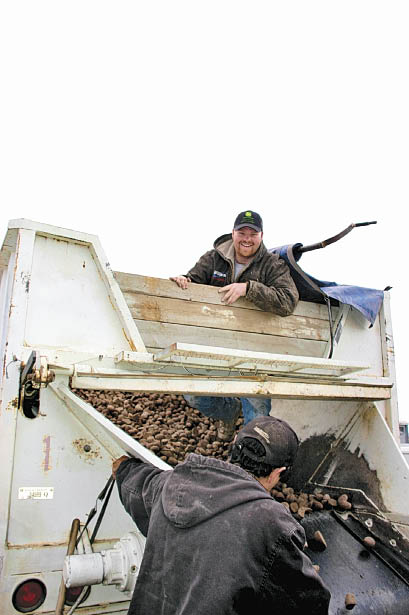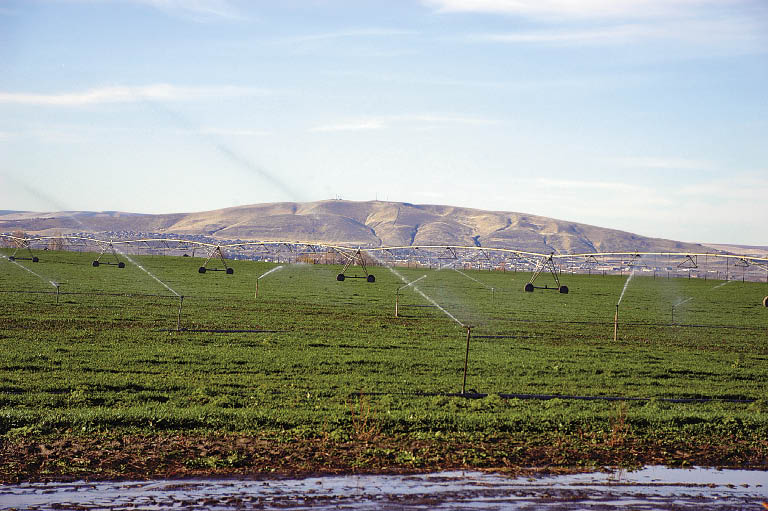
The Columbia Basin in central Washington receives on average less than 10 inches of precipitation a year-not enough for dry farms in the first half of the 20th Century to be a permanent way of life.
In 1943, Congress created the Columbia Basin Project, a large irrigation project that would divert water from the Columbia River to farm land throughout the Basin. By 1948, a pumping plant on the river near Pasco was completed, serving about 5,400 acres on what was called Irrigation Block 1.
With irrigation now able to serve thousands of acres in that first irrigation block, the U.S. Bureau of Reclamation sent out public announcements that summer to 2,500 people who had expressed interest in the 15 federally owned farm units. Several hundred inquiries were received, and 160 formal, five-page applications were filed by war veterans from half of the states in the country-including an Idaho cattleman named John Mullen.
Each applicant was expected to have farming experience, be physically and mentally fit, have good character references and a net worth of at least $3,700. All applications were carefully screened. In November a public drawing was held. Ten applicants selected their farms from the available land, signed a land sale contract with the federal government and the land was theirs to develop.
Mullen drew No. 7.
As a cattleman, he used the land to grow crops to feed the cattle in his small dairy. More than 60 years later, John's son, Randy, is still in agriculture in the Columbia Basin, only now as a potato grower.

Second Operation
Back in the late 1970s, Randy was growing hay with one of his brothers-in-law. The year 1979 turned out to be such a difficult year that Randy went to work that winter for a friend of his at a grocery store in Pasco. Instead of just working for the winter as Randy had planned, he stayed there for about four years.
When John passed away in the fall of 1983, Randy knew he had a decision to make-if he wanted to farm, it was now or never.
"I figured that was going to be the last opportunity I would have to go back to farming if that's what I wanted to do," he says. "So that's what I decided."
A neighbor helped him get started growing potatoes, and the first year was a success. After that, Randy was "hooked."
Mullen Farms grows over 1,000 acres of potatoes, predominantly Russet Norkotahs, as well as Atlantics and Potandon varieties Klondike Rose, Gold Dust and Pure Gold. Along with their potatoes, they grow Timothy hay, sweet corn, wheat, about 200 acres of onions and occasionally corn seed. While most of their ground is irrigated under center pivots, they still have about 300 acres under rill siphon tubes.
In the Tri-Cities area of southeastern Washington, planting typically begins the last week of February. They start harvesting the minis in June, and continue harvest all the way until October on the rest of their varieties.
Randy is also part-owner of a packing shed called Harvest Fresh, which sells through Potandon Produce and works in close conjunction with two other packing sheds: Balcom & Moe and Pacific Produce.
The three plants have a sales arrangement that works well for all. When they're running low on inventory, one will shut down-they rotate each time-so the other two can be more efficient. In order to keep the shut-down plant from being slighted when the market is hot, they have a pooling system that takes away that concern.
Randy says that, at least in the state of Washington, theirs is a unique operation. Whereas about 90 percent of potatoes in Washington are contracted and the onions are not, Randy says they're the opposite-their onions are contracted and their potatoes are not.
And being that they're in Block 1, they're 10 days warmer than most other potato-growing areas in the state, this allows them to be more competitive in the fresh market.

International Family
Randy and his wife, Tracy, have seven children and two grandchildren. The couple, married seven years ago, collectively bring three children from previous marriages.
His family is heavily involved in the industry. Randy's daughter, Randi Hammer, is teaching school right now but will be going on sabbatical this year to help out on Mullen Farms with the books. Randi's husband, Mark, is the interim farm manager. Randy's son, Ryan, works for both Mullen Farms and Harvest Fresh. Tracy is in private practice as a mental health counselor, and recently served as the Washington Potato and Onion Association director. That title has since been passed on to daughter, Randi Hammer. Tracy's biological son, Gates Michel, is attending Washington State University.
Both Randy and Tracy wanted to have children together. Because they consider themselves fortunate in their lives, they wanted to give children from other countries a second chance and share their blessings. They adopted four children from two different countries-two from Haiti, two from Guatemala. Dounelson, 11, and Julia, 7, are from Haiti. Augustus-or "Gus" for short-is 8 and a biological brother to Sophia, 6.
Randy loves the fact the people in the industry-counting many of them his best friends-and that, of course, includes so many of his immediate family.
"I really enjoy the fact that I've got my whole family working here on the farm," he says. "My hope is that someday they will carry on."

Eternal Optimist
Randy has served on the National Potato Promotion Board (now the United States Potato Board) before serving on the Washington State Potato Commission and the Washington State Potato Committee. He's back on the U.S. Potato Board and is currently wrapping up his term as vice president of the National Potato Council, prior to serving as its president.
Even though the scariest thing they're starting to see in the Basin right now is zebra chip, he says he's an eternal optimist.
"A couple years ago, [the problem] was potato tuber moth.but that problem seems to have gone away. I hope it stays that way," he says.
He's also eternally optimistic for the industry as a whole because consumers are trending toward fresh-cut fries at quick-service restaurants like Five Guys-of which they're a supplier-and IN-N-OUT Burger. He's also optimistic about the possibility of the Mexican fresh potato market expanding.
"[It's] about as bright right now as it's been in several years," he says. "If that opens up completely, it's going to be huge for potatoes."